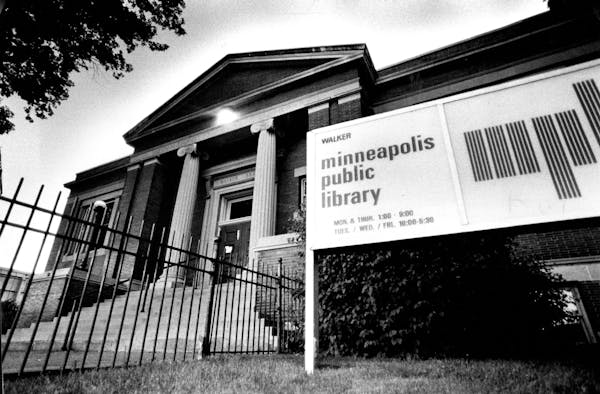Students have chowed down, picked up groceries, sat for haircuts and run other errands for more than a century at the corner of Washington Avenue SE. and Harvard Street. But the wrecking ball is coming for this slice of campus past, with a 26-story apartment building on the way.
The nondescript row of storefronts is one of the few historical commercial structures still standing in the rapidly evolving Stadium Village area, named after the Memorial Stadium that once dominated the edge of campus. Popular campus hangouts there, such as Big 10, Village Wok, Espresso Exposé and Bun Mi, have recently announced closing dates.
The building's 111-year history touched myriad U students. But it also played a role in the life of legendary Minnesota politician Hubert Humphrey, who worked as a pharmacist on the corner to support himself through college in the late 1930s. Passersby 80 years ago might have even seen Humphrey with his pal Orville Freeman — future governor and U.S. agriculture secretary — honing their debate skills at Brown's Drug late into the night.
The Humphrey wrinkle — not highlighted in the city's historical review — isn't likely to protect the 1905 building, which will be demolished for a 438-unit luxury apartment building geared toward professors and downtown professionals. It's one of many new residential buildings to rise in the area, bisected by the Green Line light rail, that have brought renewed vitality to the street. But some worry it comes at the expense of small businesses.
"You're going to end up with a bunch of national chains with 20-year guaranteed leases, because developers aren't interested in independently owned businesses," said Todd DuPont, co-owner of Big 10, which closes Sept. 3 after 60 years in business. "They want guaranteed money because developers sell their buildings, they don't hang on to them."
Politics at the counter
One of those independent mainstays, Harvard Market, operated in the building for most of the 20th century before closing several years ago. Another was Brown's, which opened in the early 1900s and was replaced by Harvard Drugs by the 1960s.
Humphrey landed a job there in 1937 soon after his father, a pharmacist who ran a drugstore in Huron, S.D., drove him and his wife, Muriel, to campus. Humphrey, a registered pharmacist, had been helping run the family business before returning to school.
"Plunged once again into the world of ideas, I squeezed every minute for what it was worth," Humphrey, who became the city's youngest mayor in 1945, wrote in his autobiography. "And each moment was saturated with the essence of my future life: politics, debate on issues, change in society. It was a joyous time."
The couple eked out a living, revolving through several tiny apartments around campus. As Humphrey made an impression on his fellow students, some would drop by the drugstore to chat him up about world events.
Famed Minnesota novelist Frederick Manfred, who met Humphrey while visiting campus, would stop by the drugstore for a malted milk and a spirited discussion of the New Deal, Hitler and the looming world war.
"He had a curious way of doing two things at the same time — keeping a quick eye out for a customer who might drop by at the same time that he kept up a running argument with me," Manfred recalled in a 1978 memoir for Minnesota History magazine.
Richard Scammon, a Minneapolis native who became a prominent national political analyst, expressed a similar memory in a 1991 oral history.
"I used to sit up at the counter and we'd talk politics for half an hour or so," Scammon said. "I don't know whether Brown ever got mad at it or not, but he didn't say anything about it; Humphrey was a good soda jerk."
Freeman, whose son Michael is now Hennepin County attorney, and Humphrey were members of the university's debate team. But their busy schedules — Freeman was on the football team — left little time for debate prep.
"So that was when the talk about getting together at the drugstore [began]," said Orville's wife, Jane. "And Humphrey often took, apparently, the night shift. So they met in the late evening … at Brown's Drug."
A growing city
Little evidence of Brown's remains today — no local historical institutions could locate historical photos of the block, except in aerial shots of Memorial Stadium.
One building on the block during Humphrey's time, a White Castle, will survive the demolition; it was long ago moved to 33rd Street and Lyndale Avenue. It's likely Humphrey ate there, as he mentions visiting White Castle when he and Muriel were too tired to cook.
The only current restaurant likely to survive the project is Village Wok, whose owner is part of the entity that owns the building. Owner Bill Chan said he expects to reopen in the new building in 2018.
Coffee drinks are now served up at what was once Brown's, now Espresso Exposé.
Council Member Cam Gordon, who holds office hours there, lamented the "heartbreaks" that have befallen some unique Stadium Village businesses. He highlighted the Oak Street Cinema, for example, which fell to make way for The Edge apartments and a Yogurt Lab.
"But obviously there's another side to all of this," Gordon said, noting the addition of the Green Line and related transit-oriented development. The city is growing, he said, and housing students close to the University eases pressure on the lower-density surrounding neighborhoods.
"People should look at Stadium Village and remember the story," Gordon said. "And think about it as, 'More things are coming.' "
Eric Roper • 612-673-1732
Twitter: @StribRoper

Wolves vs. Nuggets series updates: Times for first four games set
Medical examiner identifies pedestrian hit by vehicle and killed in Bloomington
Souhan: A sausage? A knee surgery? Minnesota sports has gone mad

